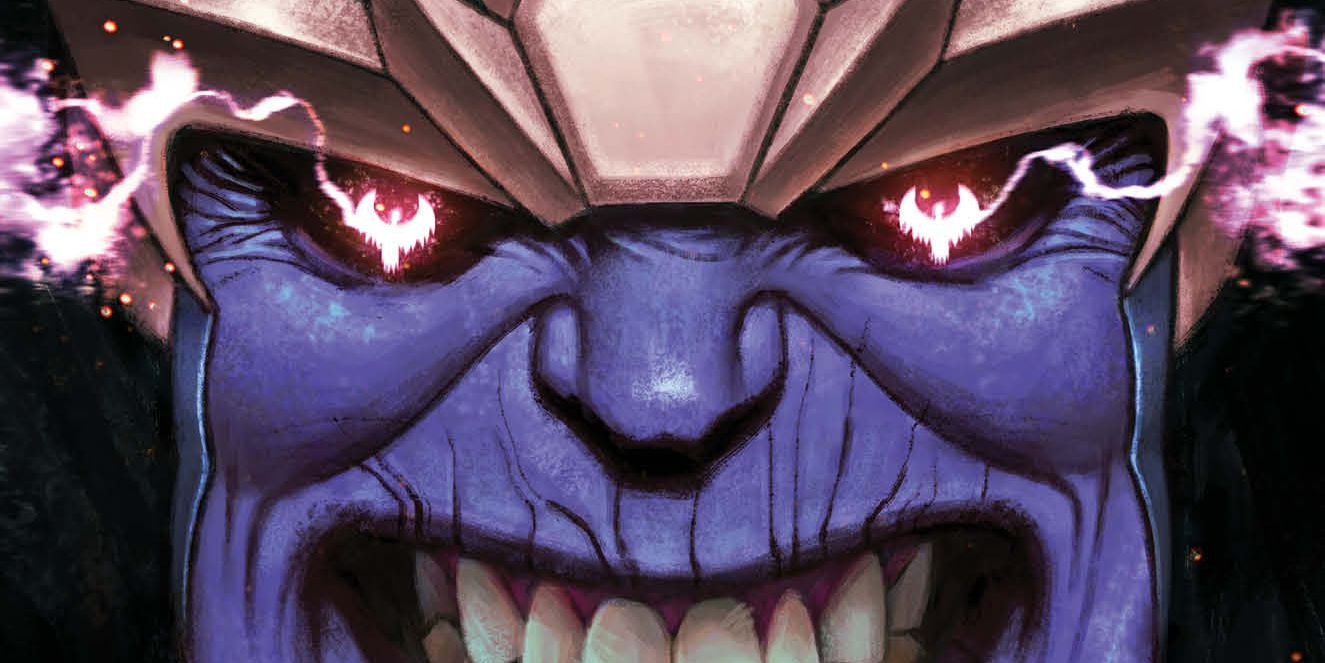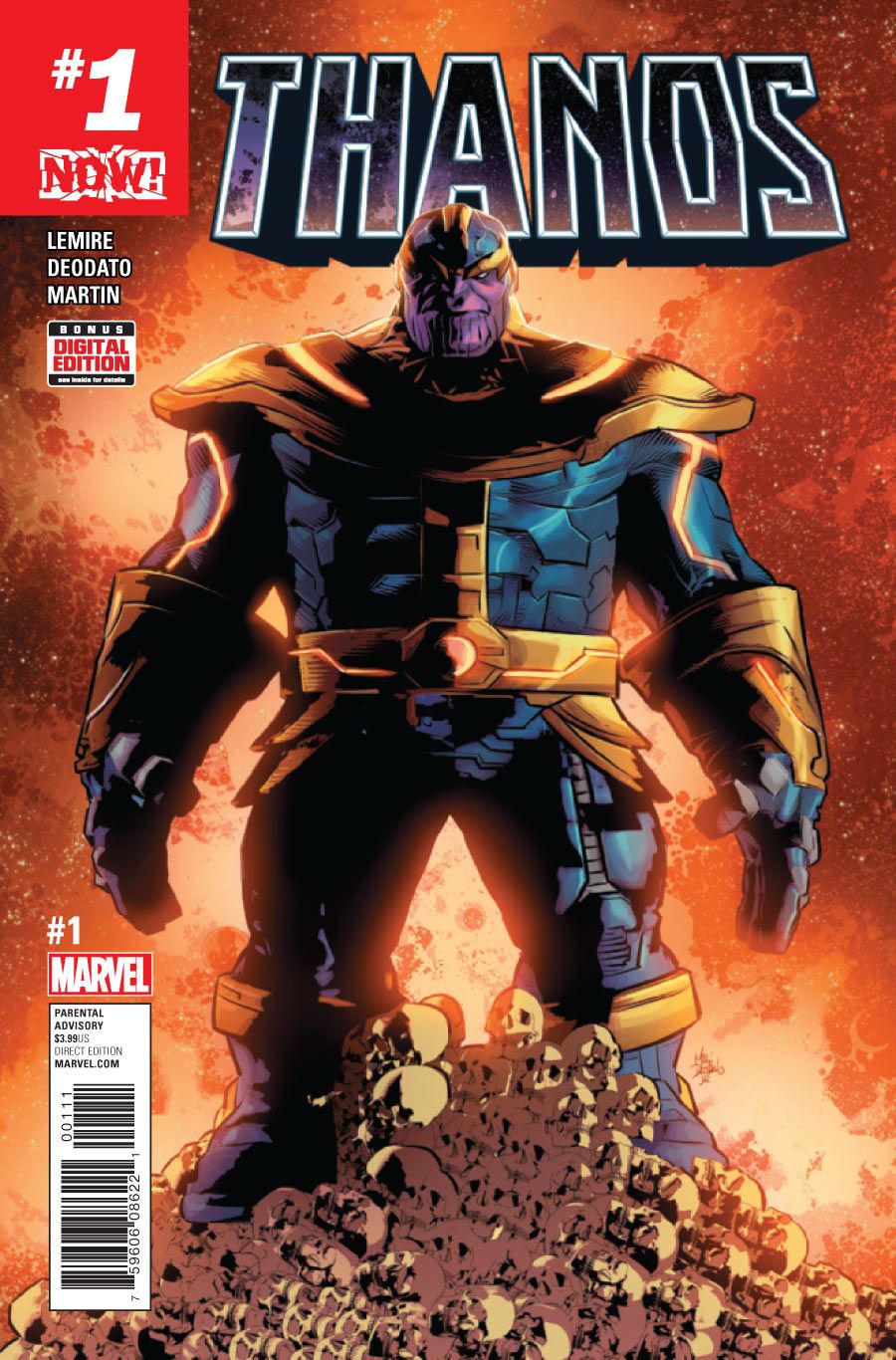This week, Marvel launches a new series starring one of its greatest villains, Thanos of Titan. The series is written by Jeff Lemire and pencilled by Mike Deodato, with covers by Jeff Dekal.
But will Lemire and Deodato's "Thanos" actually be able to get his character right when so many creative teams have gotten him so very wrong?
RELATED: Lemire Is “Setting Up a Massive Marvel Story” in “Thanos”
More than just about any other character in mainstream superhero comics, Thanos is linked indelibly to his creator, Jim Starlin, who has written nearly every important story featuring the Mad Titan. In fact, when CBR reader's voted in 2013 on the 10 greatest Thanos stories of all time, every single one was written (and in some cases also drawn) by Starlin.
Meanwhile, non-Starlin Thanos stories have a notorious reputation for getting the character very, very wrong.
After "Infinity Gauntlet," Starlin allowed Thanos to grow and change, at times even abandoning his love of Death. In Starlin's hands, Thanos has been an anti-hero who will fight to stop cosmic-level threats, but sometimes has little concern for the lives of individuals he sees as beneath him.
Unfortunately, too few other creators have followed Starlin's lead. Instead, we repeatedly get Thanos as the '70s-era Mad Titan, intent on destroying all life in the universe. It's such a radically different approach to the character that Starlin eventually wrote an entire miniseries, 2002's "Infinity Abyss," to retcon away the evil Thanoses of other creators as imperfect clones. (It was basically the cosmic equivalent of John Byrne's infamous retconning away Arcade lighting a match on Doctor Doom's armor.)
Even skilled creators have used Thanos poorly. "Infinity," written by Jonathan Hickman and illustrated by a team that included Jim Cheung, Jerome Opeña and Dustin Weaver, was hurt by its subplot involving Thanos's nonsensical invasion of Earth as cover for the murder of his Inhuman son Thane, a low point in Hickman's otherwise stellar "Avengers" run. It's almost impossible to reconcile Hickman's Thanos with Starlin's contemporaneous portrayal in the "Thanos: The Infinity Revelation" graphic novel and its sequels.
But Hickman's 'sins' against Thanos are ultimately relatively minor in comparison to what others have done with him. Perhaps my most frustrated comics-reading experience in the past year was reading "Civil War II: Free Comic Book Day," only to discover a panel where Thanos was carrying a 90's-style Big F---ing Gun (BFG), with two more strapped to his back via bandoliers. It was a laughably bad take that would have been out of character in the '70s, let alone post-"Infinity Gauntlet."
And yet, despite all of that, I am genuinely looking forward to the Lemire/Deodato "Thanos."
Jeff Lemire deserves a lot of the credit for my excitement. When I read Lemire's "Essex County" in 2011, I was struck by his distinctive voice and how he crafted nuanced characters who have been beaten down by the world around around. Since then, literally everything I have read by Lemire has impressed me, though probably nothing as much as "Descender," his creator-owned Image Comics series with Dustin Nguyen. If Lemire brings a similar depth of character to "Thanos" as we've seen in projects like "Descender," it could be a Marvel series for the ages.
According to Lemire, that's just what he intends to do. In an interview with CBR, Lemire emphasized the book would be character-driven, even as it encompasses stories at a galactic scale.
"I think the best genre stuff that I’ve done, like 'Sweet Tooth' and 'Descender,' have had these huge canvases like 'Thanos' will," Lemire said of the series. "But at the heart of it, it’s very small, character-driven stories. That’s how I want 'Thanos' to be, too. It’s his journey, but it’s also the journey of Thane and Starfox and other characters, and their relationship with Thanos. But it also has a huge canvas and huge potential, so I want to try and balance it where you get a bit of both."
That's an approach to Thanos I think could really work.
The other reason I'm optimistic about this new "Thanos" is that a more nuanced take on the Mad Titan is inevitable in a self-titled book. While it's possible to wallow in villainy for a one-shot or a miniseries, it's practically impossible to do the same in an ongoing without quickly turning off the audience. This is why we tend to get books with conflicted villains, like "Harley Quinn" or "The Superior Spider-Man," rather than outright monsters like the Joker. Thanos might remain a villain, but for his book to survive, he'll need to focus his villainy in productive directions, such as stopping even greater threats to the cosmos.
I do have one major worry, though, that whatever character development we get in "Thanos" will be quickly abandoned once again. With "Avengers: Infinity War" set for release in 2018, there is going to be incredible editorial pressure for a crossover starring the Mad Titan in the villain role. And while I trust Lemire and Deodato to tell a character-based story rich in nuance, I'm not sure I trust whomever ends up assigned to create the inevitable crossover.
In the meantime, I am definitely looking forward to "Thanos," and remain cautiously optimistic about the Mad Titan's future in the Marvel Universe.


